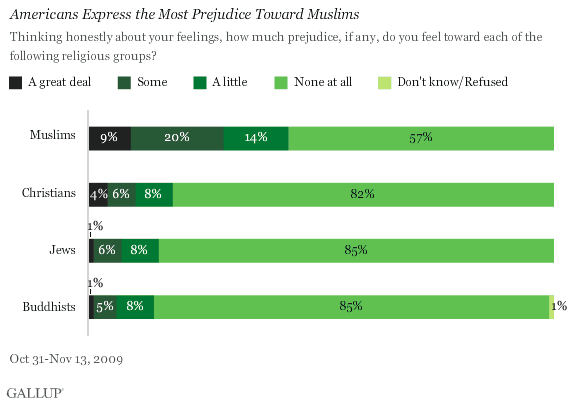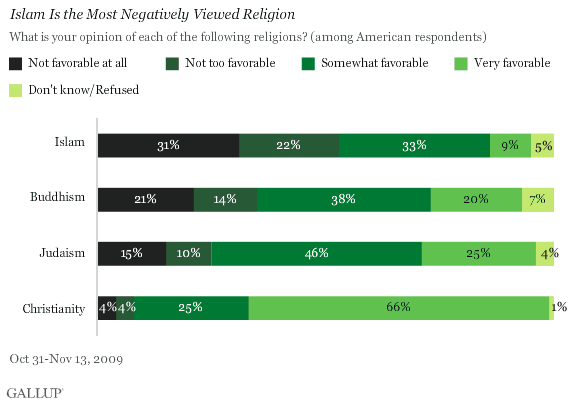WASHINGTON, D.C. -- More than 4 in 10 Americans (43%) admit to feeling at least "a little" prejudice toward Muslims -- more than twice the number who say the same about Christians (18%), Jews (15%) and Buddhists (14%). The findings are based on a new Gallup Center for Muslim Studies report, "Religious Perceptions in America: With an In-Depth Analysis of U.S. Attitudes Toward Muslims and Islam," released Thursday.

In a separate question asking Americans to express their overall view about each of the four religions evaluated, Islam is the most negatively viewed. Nearly one-third of Americans (31%) say their opinion of Islam is "not favorable at all" versus 9% who say their opinion is "very favorable." This stands in contrast to Americans' views of Christianity and Judaism, which are far more likely to be "very favorable" than "not favorable at all," while Buddhism draws almost equally positive and negative opinions at the extremes. Gallup conducted the nationwide U.S. survey between Oct. 31 and Nov. 13, 2009, spanning the Fort Hood shooting in which a U.S.-born Muslim military doctor killed 13 people on the Army base on Nov. 5.

The new report further explores variables that are associated with extreme prejudice ("a great deal") toward followers of Islam as well as variables that may be related to lack of prejudice. To download the full report, go to https://muslimmatters.org/. Key findings from the report will also be released next month in Cairo, Egypt. The Gallup Center for Muslim Studies conducts its Washington, D.C., and Cairo launches with its Muslim West Facts partner, the Coexist Foundation.
Survey Methods
Results for this Gallup Panel study are based on telephone interviews with 1,002 national adults, aged 18 and older, conducted Oct.31-Nov.13, 2009. Gallup Panel members are recruited through random selection methods. The panel is weighted so that it is demographically representative of the U.S. adult population. For results based on this sample, one can say with 95% confidence that the maximum margin of sampling error is ±3.4 percentage points.
In addition to sampling error, question wording and practical difficulties in conducting surveys can introduce error or bias into the findings of public opinion polls.
